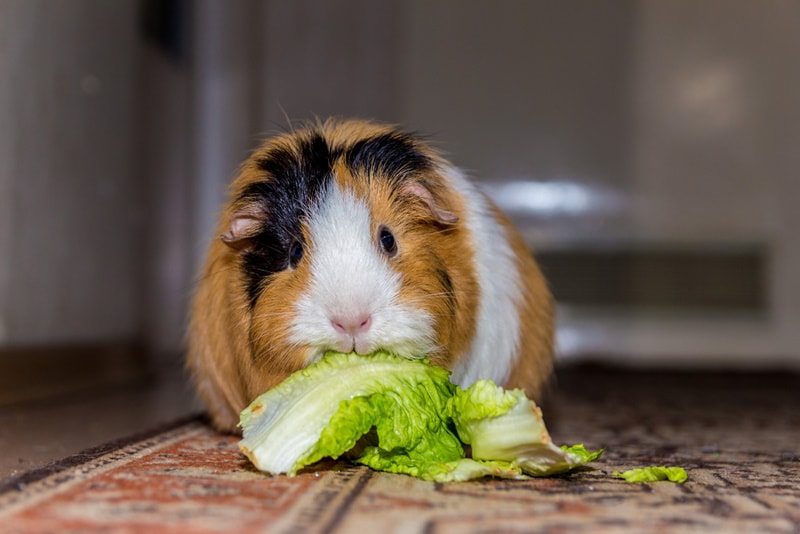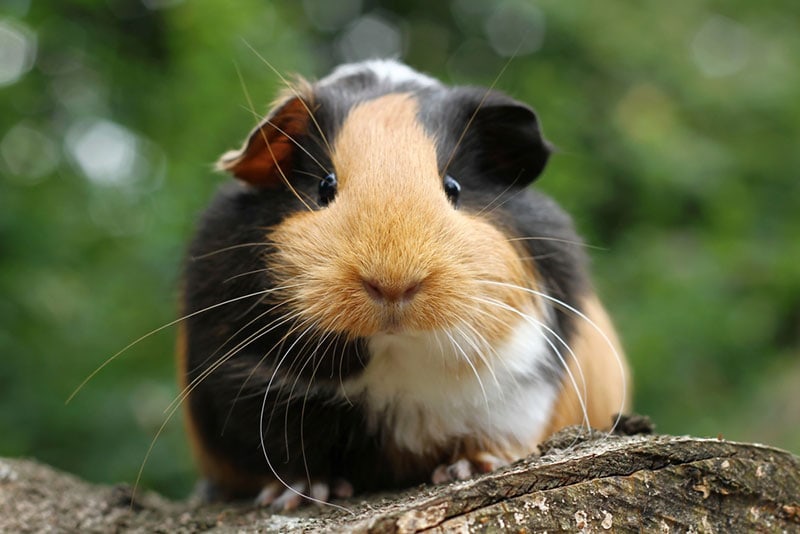Can Guinea Pigs Eat Melon? Vet-Approved Diets & Types
Updated on

During summer, a favorite fruit that quenches our thirst is melons. Melons come in all shapes, sizes, and tastes—from bitter and sour to extremely sweet. While we are used to eating this fruit in large amounts and even offering them to our dogs, other pets may also adore the taste of melons. Guinea pigs enjoy eating fruits occasionally, so you will probably notice them enjoying a bite of your watermelon. Luckily, melons are entirely safe for guinea pigs to consume if they eat them in moderation.
Wondering whether this fruit is safe for your piggy is a legitimate question, and you can find a detailed answer below.
Can Guinea Pigs Eat Melons?
Since melons are a favorite treat during summer, you must wonder whether offering them to your guinea pig is safe. Fruit, in general, is not advised in high amounts for guinea pigs since they don’t usually eat much in the wild. However, melons are safe in smaller quantities. There are several types of melons, each with benefits and risks for guinea pigs.
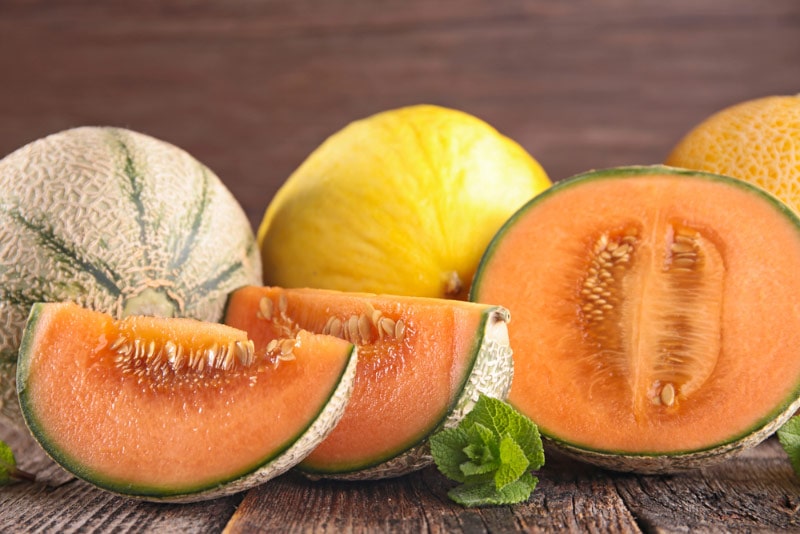
Cantaloupe
Cantaloupes are safe for guinea pigs as long as they consume small amounts. You can feed them occasionally and your guinea pigs will adore the sweetness. Cantaloupes are a rich source of vitamins and minerals such as magnesium and calcium. However, cantaloupes are filled with sugar, which in large amounts can be dangerous for guinea pigs.
Nutritional Value of Cantaloupe (100 g):1
- Water: 2 g
- Protein: 84 g
- Carbohydrate: 16 g
- Fiber: 9 g
- Sugar: 86 g
- Calcium: 9 mg
- Magnesium: 12 mg
- Vitamin C: 7 mg
Watermelons
While a guinea pig’s diet should be based around grass, hay, guinea pig pellets, and veggies, offering a bit of watermelon from time to time won’t hurt them. Watermelons are filled with vitamins and minerals but are mostly made of water, making them healthy for guinea pigs in moderation. Remove the seeds when offering watermelons, as they can be a choking hazard.
Nutritional Value of Watermelons (100 g):2
- Water: 4 g
- Protein: 61 g
- Carbohydrate: 55 g
- Fiber: 4 g
- Sugar: 2 g
- Calcium: 7 mg
- Magnesium: 10 mg
- Vitamin C: 1 mg
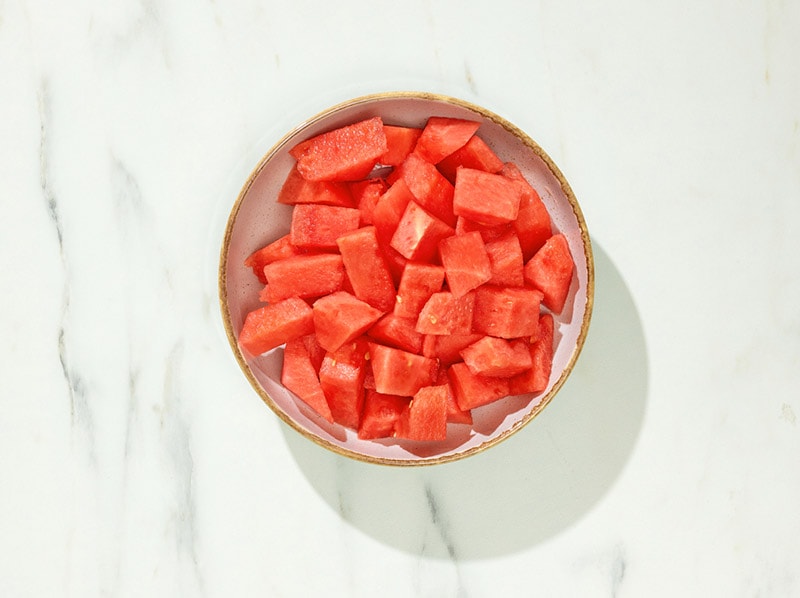
Honeydew Melon
Honeydew melon is a healthy and beneficial fruit, filled with minerals such as calcium, magnesium, potassium, and phosphorus. Honeydew melons are also filled with vitamin C, which boosts the immune system. However, the high sugar content may be risky for guinea pigs, so only offer honeydew melon occasionally.
Nutritional Value of Honeydew Melon (100 g):3
- Water: 8 g
- Protein: 54 g
- Carbohydrate: 09 g
- Fiber: 8 g
- Sugar: 12 g
- Calcium: 6 mg
- Magnesium: 10 mg
- Vitamin C: 18 mg
Ideal Guinea Pig Diet
When formulating the ideal meal plan and diet for your guinea pig, remember to base their meals around primarily grass and hay. When in doubt, keeping their diet similar to their natural diets is always recommended. In the wild, guinea pigs would graze, feeding on mostly grass, herbs, and plants such as dandelion and groundsel.
Hay and Grass
Hay and grass are vital for guinea pigs for several reasons. Guinea pigs’ diet must rely on these two things for their digestive systems to function correctly. They are also essential for guinea pigs because they help keep their teeth at the correct length. Your pigs should have fresh hay available at all times.
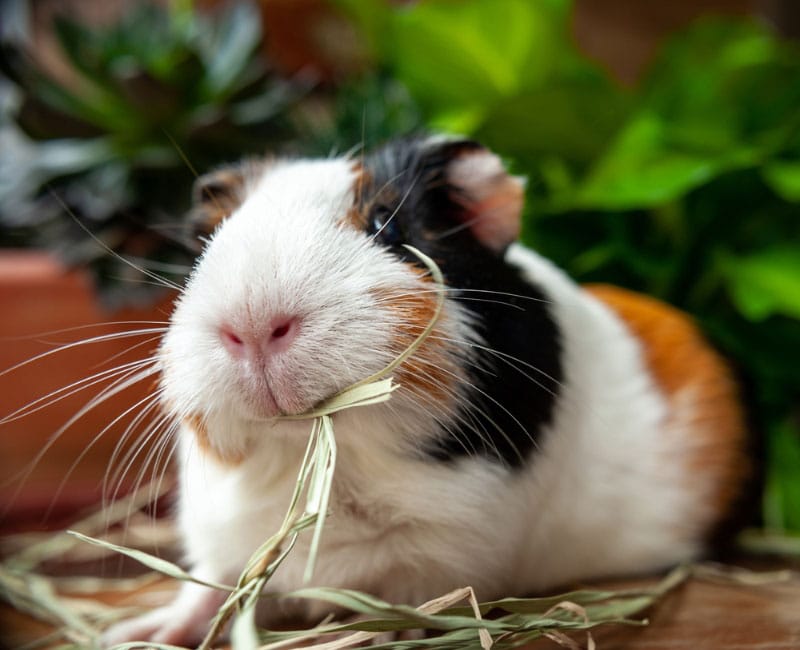
Fruits and Vegetables
Make sure your guinea pig has fresh, leafy greens as well. If you’re offering vegetables or fruits to your guinea pig, you must thoroughly wash them first. Kale and broccoli are terrific sources of vitamin C for guinea pigs, while you should avoid citrus fruits. Apple, carrots, and sweet potatoes are safe for guinea pigs to consume, but only in small quantities and as an occasional treat.
Pellets
Another excellent dietary choice for your guinea pig is grass-based pellets. Offering grass-based guinea pig pellets will provide your guinea pig with enough vitamin C. However, these pellets should be fed in moderation only.

Dos and Don’ts
- Adjust feeding quantities to prevent your guinea pig from being overweight or underweight.
- Don’t change your guinea pig’s diet suddenly.
- Do not feed your guinea pig lawn clippings.
- Offer more pellets if your guinea pig is pregnant or nursing.
- Avoid feeding fruits and root vegetables too often.
Final Thoughts
Melons are a delicious summer fruit that many people and pets enjoy as refreshments. However, you probably wondered at one point whether your pet guinea pig could also enjoy some melon. Melons are a nutritious and healthy fruit with some nutritional benefits for guinea pigs, such as vitamin C. However, it is essential only to offer melons in moderation to your guinea pig, as the high sugar content can be risky for them to consume too frequently.
Featured Image Credit: Arina P Habich, Shutterstock


